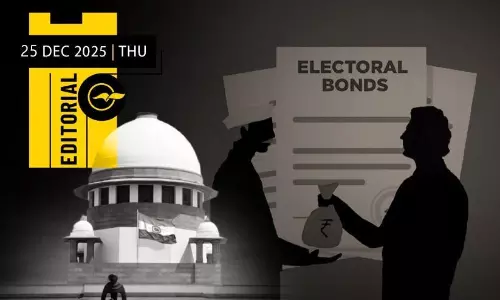
Pakistani diplomat to leave, Pakistan retaliates
text_fieldsNew Delhi/Islamabad: Marking a sharp downturn in ties, India on Thursday asked a junior Pakistani diplomat to leave by Saturday for running a spy ring. Pakistan retaliated with a similar move, asking an Indian official in Islamabad to leave.
Hours after Indian Foreign Secretary S. Jaishankar summoned Pakistan High Commissioner Abdul Basit in New Delhi to protest against Mehmood Akhtar, a visa officer at the Pakistan High Commission, who India accused of spying, Islamabad hit back.
In the evening, Pakistan Foreign Secretary Aizaz Ahmad Chaudhry summoned Indian High Commissioner Gautam Bambawale in Islamabad and declared Indian High Commission official Surjeet Singh as persona non grata and asked that he leave the country by Saturday.
Pakistan denied the espionage charges levelled against Akhtar as "false and unsubstantiated", and alleged that Indian police "manhandled" him.
Akhtar, detained on Wednesday and let off because of diplomatic immunity, had served in the mission for over two years during which he recruited Indians to spy for Pakistan's Inter-Services Intelligence (ISI), Delhi Police Joint Commissioner Ravindra Yadav said.
He was caught near the Delhi Zoo receiving defence-related vital information from two Indian nationals, Maulana Ramzan and Subhash Jangir, who were also allegedly working for the ISI, Yadav said.
One more person, Sohaib Nagaur, was arrested in Jodhpur on Thursday evening. The three are residents of Rajasthan and were being interrogated.
"They had collected information regarding defence, BSF (Border Security Force) deployment on the borders" in Rajasthan and Gujarat and also carried deployment charts and maps of some Indian positions, Yadav said.
The documents, including information about several retired Indian Army personnel and BSF officers serving on borders, were given to Akhtar in exchange of money, he said.
The police officer said Akhtar initially presented himself as an Indian citizen and also showed a fake Aadhar card, claiming he was Mehboob Rajput of Chandni Chowk in Old Delhi.
Yadav said after sustained questioning he admitted that he was a soldier with Pakistan Army's 40 Baloch Regiment since 1997 and was deputed to India by the ISI in 2013.
"He was a kingpin" of the spying network that was active for 18 months, the police officer said, adding the involvement of other staff members in the ring was not being ruled out.
The Pakistan Foreign Ministry said the diplomat was detained for three hours on "false and unsubstantiated" charges of espionage before he was returned to the mission.
"We condemn the detention and manhandling of our diplomatic official," a statement said.
"This act clearly reflects Indian actions to shrink diplomatic space for the working of the Pakistan High Commission," the statement. It noted that Akhtar's detention violated the Vienna Convention.
India categorically denied that the accused officer was mistreated. "He was treated with courtesy befitting his diplomatic status," Swarup said.
"In fact, it was Akhtar who resorted to subterfuge by concealing his real identity. Pakistan must ensure that none of its members indulge in activities inimical to India or behave in a manner that is incompatible with their diplomatic status."
Conveying the decision to expel the Indian high commission official, the Pakistan Foreign Secretary also expressed "deep concern" over the activities of the Indian official, which he said, was in violation of the Vienna Convention and the established diplomatic norms.
The Indian High Commission was asked to make necessary arrangements to make Surjeet Singh and his family leave Pakistan by October 29.
The tit-for-tat expulsions come as India and Pakistan are locked in bitter diplomatic tension after militants attacked a military base in Jammu and Kashmir last month.
The attack prompted the Indian Army to carry out surgical strikes in Pakistan-administered Kashmir, destroying seven terror launch pads and killing an unknown number of terrorists and their sympathizers.










